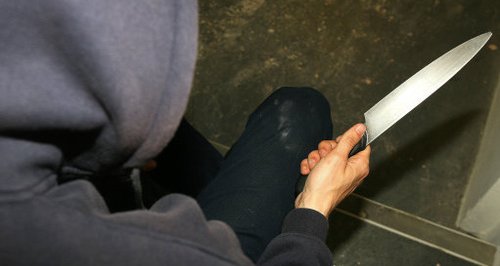Knife crimes going unsolved
30 May 2019, 06:20 | Updated: 30 May 2019, 06:21

Two thirds of knifepoint robberies in England and Wales go unsolved each year, figures suggest.
Data obtained under the Freedom of Information Act showed that thousands of the investigations ended with no suspect identified.
Around three in 10 incidents of violence against the person involving a knife also went unsolved, as did around one in six of possession of a bladed weapon.
A request was made for the total number of each of the following crimes recorded, and the outcomes of the investigations, in 2017, 2018 and 2019 up to March:
- Robbery involving a bladed weapon
- Violence against the person
- Possession of an offensive weapon where that was a bladed article; and possession of a bladed article
Among 22 forces in England and Wales which provided data in a comparable format, a total of 12,783 robberies involving a knife or bladed weapon were recorded in 2017; 15,588 in 2018, and 3,540 up to March 2019.
Of these, in 2017 a total of 8,837 ended with no suspect identified - 69% of the total recorded. Of those 7,319 were classed as Home Office outcome 18 (Investigation closed - no suspect identified) and 1,518 as outcome 14 (victim declines or is unable to support action to identify offender).
For 2018, a total of 10,456 ended with no suspect identified, 67% of the total. Of these 8,800 were outcome 18, and 1,656 were outcome 14.
For the first part of this year up to early March, 1,739 investigations ended with no suspect identified - 49% of the total recorded. These included 1,501 with outcome 18 and 238 with outcome 14.
Che Donald, national vice-chairman of the Police Federation of England and Wales, said: "While the number of unsolved knifepoint robberies and other knife crimes appears to be slightly decreasing year on year, according to the Press Association figures, there is no denying that the numbers are uncomfortably high.
"Combined with an 8% overall increase in knife crime across England and Wales, what is blatantly apparent is that our over-stretched and under-funded police forces are battling an explosion in violent crime which shows no sign of abating."
He said that while there were nearly 5,000 hospital admissions due to knife violence in England last year and knife crime is at its highest since 2011, budget cuts mean there are nearly 20,000 fewer police officers than in 2010. There is also a national shortage of detectives.
Mr Donald added: "Our detective ranks have been decimated, with huge gaps in investigation teams across all 43 forces. This means that following up crime reports becomes increasingly difficult, particularly in complex drawn-out investigations.
"Some vulnerable victims of crime need to be dealt with appropriately by specially-trained officers in order for cases to proceed and eventually succeed in court. If we don't have enough specialists to do that, more offenders will then slip through the net."
He said police must be properly resourced to tackle the rising tide of violence.
Patrick Green, chief executive of anti-knife crime charity the Ben Kinsella Trust, said: "It is deplorable that nearly two third of criminals who use knives to commit robberies are not put in front of the courts.
"While it is clear that the police are doing all they can to tackle this increasing problem with the resources they have available, more needs to be done.
"It is vital that the police get the support and funding they require to take knives and those who carry them off our streets.
"But the police can't do this on their own.
"It is equally important that we do far more to tackle this menace much earlier by resourcing programmes that stop knife carrying becoming a way of life.
"Early intervention and prevention programmes are a proven way to change young people's mindsets and ensure that they take positive pathways in life.
"Turning them away from crime and deterring from ever carrying a knife."
Figures from the 22 forces for violence against the person, which covers a wide range of offences, revealed around three in 10 were unsolved in 2017 and 2018, and just under a fifth so far in 2019.
For 2017 4,310 out of 14,750 recorded incidents ended with no suspect identified - 29.2% of the total; 2018 saw 4,663 out of 16,139 end this way - 28.9%.
For just over the first two months of 2019, the figures were 608 out of 3,250, 18.7%.
Where a breakdown by offence type was given, the data indicated that most of the unsolved offences of this kind were assaults.
Data for possession of a knife or bladed weapon showed that around one in six recorded crimes went unsolved in 2017 and 2018, and around 19% so far in 2019.
The figures were: 2,027 out of 12,825 in 2017 (15.8%); 2,359 out of 13,983 in 2018 (16.9%) and 422 out of 3,235 up to March 2019 (13%).






